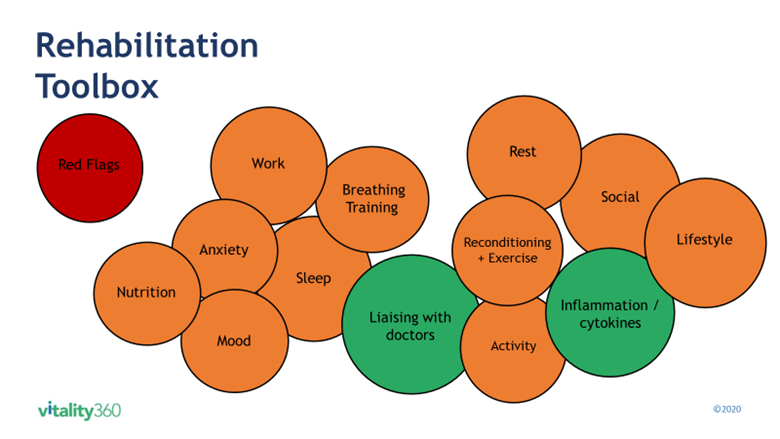Our experience at the first virtual CMSUK Conference & a summary of our presentation on fatigue and long-Covid
We were incredibly pleased to be a sponsor hosting a virtual stand at the recent CMSUK conference which was delivered online for the first time. A huge thanks to the tireless and dedicated team at CMSUK, especially Clare Parish and Katie Murray for responding so patiently and helpfully to our deluge of emails before and during the conference. Needless to say, there was a steep learning curve for everyone involved hosting an event like this and we feel that we learnt a lot from this experience that will be useful for future events. Afterall, it seems quite likely that virtual events or hybrids that include a virtual element are likely to continue. There are many benefits to virtual events of course including a hugely reduced impact on the environment as people aren’t travelling, along with being able to access materials in one’s own time. I also got to consume all the ‘free’ chocolates we had on our virtual stand!
We struggled, along with many other sponsors, to attract people to our virtual stand (a Zoom room) but once we did start to talk to people (encouraged by a treasure hunt prize) we actually probably had more meaningful conversations with them than we might have done in real life, when people may be distracted by other things.
We also offered our virtual stand visitors a short round up of our professional insights into the challenges of long Covid symptoms, from our perspective as fatigue rehabilitation experts. Here’s a quick summary of how we can offer support on our bespoke programmes.
As Health Professionals, how do we treat fatigue caused by long-tail COVID-19?
As a rehabilitation provider known for treating persistent fatigue and pain, we are now being approached by clients suffering from long Covid to help them with the range of ongoing symptoms they have been experiencing. Fatigue is by far the most common long Covid symptom, followed by breathlessness, then joint and chest pain. We have quickly realised that, although Covid is a new illness and there is still much to learn, we do have the skills gained as specialist clinicians to be able to make a difference. Through attending webinars and assimilating various sources of information to learn more about Covid-19, we were able to develop a screening process and set of rehabilitation principles that we have been using with our clients.
Post-acute symptoms: Some client experiences
We are seeing people in a post-acute phase, where most are still seeking medical and therapeutic answers to explain their sometimes frightening and bizarre symptoms. One of our clients has had to contend with waking up with blue toes (which remain unexplained), whilst another is still plagued by flashbacks of the time they couldn’t breathe and the paramedics wouldn’t admit them to hospital. Another client is trying to come to terms with the fact her distressing and severe chest pain is currently defying medical explanations and has had to completely give up work to be cared for by her partner. Many are scared they might not recover, and some feel they have had (and may still be having) a very real brush with mortality, or that they might get re-infected. A number have been over-consulting Dr Google and online peer support groups and have ended up in a cycle of anxiety and avoidance, or a fear they may have CFS/ME. We are finding some have access to good long Covid NHS care, but for others it is much patchier with gaps in medical testing and individualised therapeutic support in their onward journey of recovery.
Step by step rehabilitation programmes
What our Rehabilitation Programmes might consider
Despite the very real uncertainties and highly unusual current context, we are finding that people are making good progress and have been very reassured by having a Clinician to reflect with and guide them. By setting realistic routines, we have been able to help anchor people and stabilise their symptoms. We have explored the factors they can control and created step-by-step plans that address the factors that are most likely to help them individually. We have been able to advise on a return to work, or a gradual and careful return to activities that are important to them. We have been able to help people to put weight back on and enjoy food again and taught them meditation and breathing techniques to control any anxiety, breathlessness or disordered breathing they might be experiencing. With our experience of recognising medical deteriorations, we've been able to discuss their symptoms and advise whether or not they should seek medical advice or intervention.
In addition to support with physical symptoms, we’ve worked with clients to reflect on their use of social media or news consumption to help them manage their anxiety, as well as problem solving and signposting to help them with concerns about their finances and social circumstances. Listening, validating, and simply being with them on their journey at a time of social isolation and lack of full access to healthcare has also proven to be very valuable for clients.
Our Research Study
We have just secured ethics approval for a study in partnership with the University of East Anglia, which will explore the impact of our approach and contribute to the evidence base as knowledge around the world grows. People have also been asking us about our experiences, so we have been putting on a series of 3-hour workshops for Health Professionals to explore some of our key learnings to date.
If our specialist disciplinary service could assist you with clients with pain or fatigue we would be very happy to chat your requirements through with you further.



